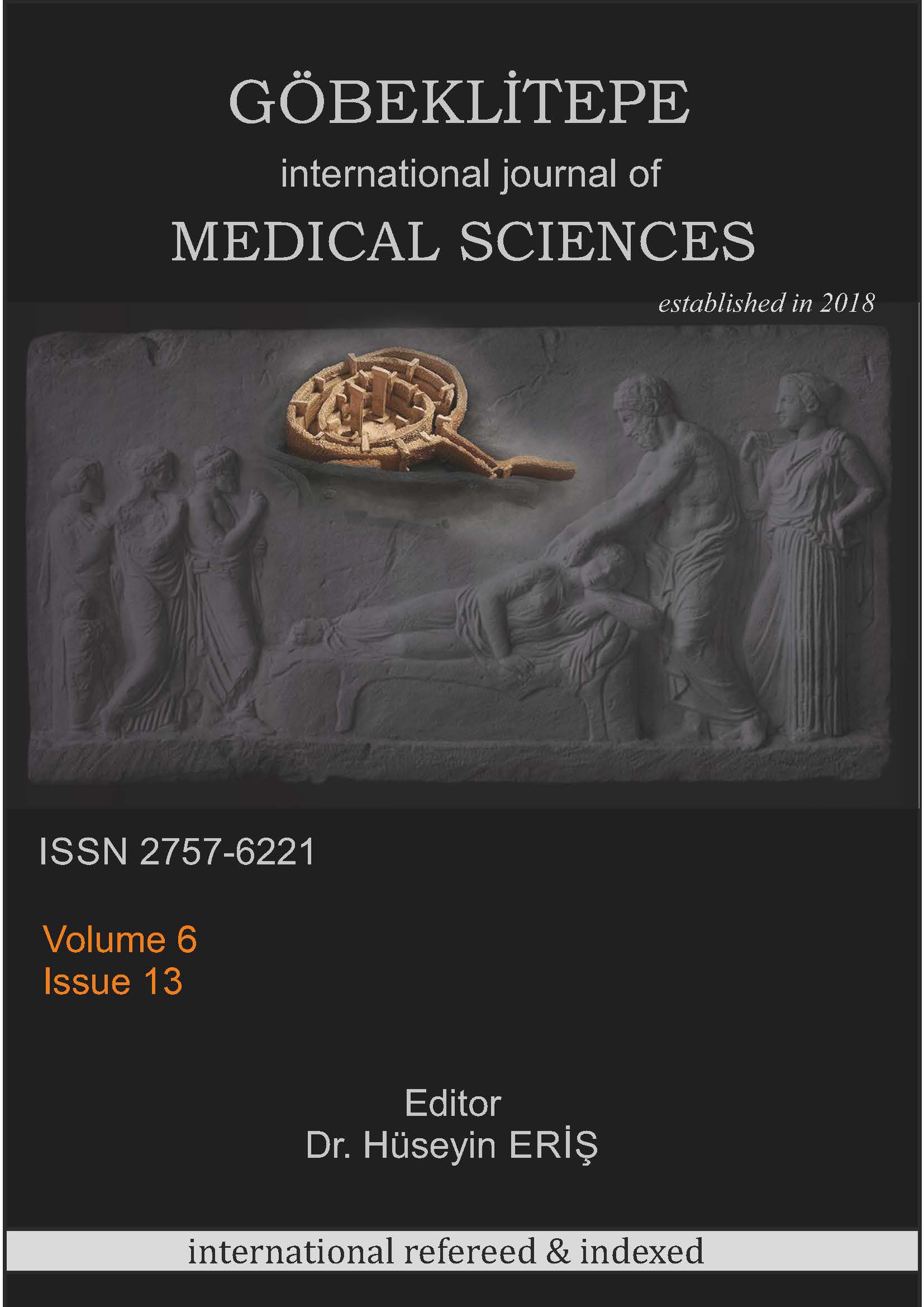INVESTIGATION OF THE RELATIONSHIP BETWEEN INTENSIVE CARE UNIT NURSES' PRIVACY CONSCIOUSNESS AND ETHICAL ATTITUDES IN NURSING
Nurses' Prıvacy Conscıousness and Ethical Attitudes in Nursing Care
DOI:
https://doi.org/10.55433/gsbd/233Keywords:
Ethical Attitude, Nursing Care, Privacy Consciousness, Intensive Care NurseAbstract
This study aimed to examine the relationship between the privacy conscıousness of intensive care nurses and their ethical attitudes in nursing care. The research was descriptive, correlational, and cross-sectional types. The study sample consisted of 194 intensive care nurses working in the intensive care units of hospitals of different sizes in Turkey. Data were collected using a personal information form, privacy consciousness scale, and ethical attitude scale in nursing care. Descriptive statistics, nonparametric tests and Spearman correlation analysis were used to the data evaulation. Our study determined the privacy consciousness level of intensive care nurses was high and their ethical attitudes in nursing care were positive. The average score of the Privacy Conscıousness Scale of intensive care nurses showed a statistically significant differences according to the institution they work in, professional experience and experiencing ethical problem variables; the total score of the Ethical Attitude Scale in Nursing Care showed a statistically significant differences according to the receiving training on ethics and patient rights, experiencing ethical problem and solving ethical problem. It was determined that there is a weak positive relationship between the privacy consciousness of intensive care nurses and the level of ethical attitudes in nursing care. It is recommended to prepare regular in-service training using visual and written materials to increase and maintain nurses' awareness of privacy awareness and ethical attitudes and behaviors, to establish follow-up and follow-up systems for the protection of patient privacy, and to establish ethical commissions to apply in cases where ethical problems cannot be resolved.
References
Işik, M. T., Özdemir, R. C., & Serinkaya, D. (2022). Ethical Attitudes of Intensive Care Nurses during Clinical Practice and Affecting Factors. Indian Journal of Critical Care Medicine: Peer-reviewed, Official Publication of Indian Society of Critical Care Medicine, 26(3), 288.
Jamshidian, F., Shahriari, M., & Aderyani, M. R. (2019). Effects of an ethical empowerment program on critical care nurses’ ethical decision-making. Nursing ethics, 26(4), 1256-1264.
Aybar, D. Ö., & Kiliç, S. P. (2020). Bir Üniversite Hastanesinde Çalışan Yoğun Bakım Hemşirelerinin Karşılaştıkları Etik Sorunların Stres Düzeylerine Etkisi. Düzce Üniversitesi Sağlık Bilimleri Enstitüsü Dergisi, 10(1), 29-35.
Bloomer, M. J., & Al-Mutair, A. (2013). Ensuring cultural sensitivity for Muslim patients in the Australian ICU: Considerations for care. Australian Critical Care, 26(4), 193-196.
Timmins, F., Parissopoulos, S., Plakas, S., Naughton, M. T., de Vries, J. M., & Fouka, G. (2018). Privacy at end of life in ICU: A review of the literature. Journal of Clinical Nursing, 27(11-12), 2274-2284.
Mahremiyet, (2022). Türk Dil Kurumu, TDK. (Ed.) (2022). Erişim tarihi:15.05.2022
Birleşmiş Milletler. (1948). İnsan Hakları Evrensel Beyannamesi -md12. Erişim adresi: https://www.ihd.org.tr/insan-haklari-evrensel-beyannames/, Erişim tarihi: 15.11.2021
Resmi Gazete, T. (1982). Türkiye Cumhuriyeti Anayasası. md.20. Erişim adresi: https://www.mevzuat.gov.tr/mevzuat?MevzuatNo=2709&MevzuatTur=1&MevzuatTertip=5#:~:text=Madde%2020%20%E2%80%93%20Herkes%2C%20%C3%B6zel%20hayat%C4%B1na,ve%20aile%20hayat%C4%B1n%C4%B1n%20gizlili%C4%9Fine%20dokunulamaz. , Erişim tarihi: 15.11.2021
Türk Hemşireler Derneği, T. (2009). Hemşirelerin İçin Temel İlke ve Sorumluluklar. Erişim adresi: https://www.thder.org.tr/uploads/files/hemsire-brosur.pdf. Erişim tarihi:15.05.2022
Resmi Gazete, T. (1998). Hasta Hakları Yönetmeliği Md. 21. Erişim adresi: https://www.saglik.gov.tr/TR,10461/hasta-haklari-yonetmeligi.html, Erişim tarihi: 15.11.2021
Resmi Gazete, T. (2010). Hemşirelik Yönetmeliği, Md. 6. Erişim adresi: https://www.mevzuat.gov.tr/mevzuat?MevzuatNo=13830&MevzuatTur=7&MevzuatTertip=5, Erişim tarihi: 15.11.2021
Zaybak, A., & Çevik, K. (2015). Yoğun Bakım Ünitesindeki Stresörlerin Hasta ve Hemşireler Tarafından Algılanması. Turkish Journal of Medical & Surgical Intensive Care Medicine/Dahili ve Cerrahi Yoğun Bakım Dergisi, 6 (4-9).
Yaman Aktaş, Y., Karabulut, N., Yılmaz, D., & Özkan, A. S. (2015). Kalp damar cerrahisi yoğun bakım ünitesinde tedavi gören hastaların algıladıkları çevresel stresörler. Kafkas J Med Sci 2015; 5(3):81–86
Tanrıkulu, F., Erol, F., Ziyai, N., Gündoğdu, H., Karabulut, B., & Dikmen, Y. (2020). Hemşirelerin hasta mahremiyetini gözetme durumlarının incelenmesi. Journal of Innovative Healthcare Practices, 1(1), 22-29.
Aktan, G. G., Eşer, İ., & Kocaçal, E. (2019). Hemşirelerin hasta mahremiyetini koruma ve sürdürme durumları ile etkileyen faktörler. Koç Üniversitesi Hemşirelikte Eğitim ve Araştırma Dergisi, 16(4), 301-305.
Candan, M., & Bilgili, N. (2018). Hemşire ve ebelerin hasta mahremiyetine ilişkin görüşlerinin değerlendirilmesi. Gazi Sağlık Bilimleri Dergisi, 3(3), 34-43.
Geller, G., Schell-Chaple, H., Turner, K., Anderson, W. G., & Beach, M. C. (2018). Measuring patient respect in the intensive care unit: Validation of the ICU-RESPECT instrument. Journal of Critical Care, 46, 63-66.
Beach, M. C., Branyon, E., & Saha, S. (2017). Diverse patient perspectives on respect in healthcare: a qualitative study. Patient education and counseling, 100(11), 2076-2080.
Kim, K., Han, Y., & Kim, J.-s. (2017). Nurses’ and patients’ perceptions of privacy protection behaviours and information provision. Nursing ethics, 24(5), 598-611.
Kurt, D. (2021). Hemşirelik Öğrencilerinde Mahremiyet Bilinci ve Etik Duyarlılık. Türkiye Biyoetik Dergisi, 8(3), 144-153.
Öztürk, D., Eyüboğlu, G., & Baykara, Z. (2019). The Privacy Consciousness Scale: Turkish validity and reliability study. Turkiye Klinikleri Journal of Medical Ethics-Law and History, 27, 57-64.
Cerit, B., Çoşkun, S., Çalışkan, M. A., & Temelli, G. (2021). The relationship between nurses’ ethical sensitivity levels and their attitudes toward principles about die with dignity. Journal of religion and health, 60(1), 162-177.
Soper, D. S. A. f. (2021). A-priori Sample Size Calculator for Multiple Regression [Software]. Erişim adresi: https://www.danielsoper.com/statcalc, Erişim tarihi:15.09.2021
Tabata, N., & Hirotsune, S. (2014). Development of the Privacy Consciousness Scale (PCS). Japanese Journal of Personality, 23(1).
Özçiftçi, S. (2020). Hemşirelik bakımında etik tutum ölçeği geliştirme. (Yüksek Lisans Tezi). İzmir Kâtip Çelebi Üniversitesi, İzmir.
Yoshimoto, M., & Wakimizu, R. (2023). Nurses’ Perception of Privacy in the NICU and GCU: A Qualitative Descriptive Study. Open Journal of Nursing, 13(2), 113-129.
Tabata, N., Sato, H., & Ninomiya, K. (2021). Comparison of Privacy Consciousness Between Younger and Older Adults. Japanese Psychological Research, 63(2), 104-110.
Eti Aslan, F., Çınar, F., & Es, M. (2019). Investigation of the privacy consciousness of surgical nurses. Kocaeli Medical Journal, 8(3), 95-103.
Özdinc, A., Aydin, Z., Calim, M., Ozkan, A. S., Bakir, H., & Akbas, S. (2023). Privacy awareness among healthcare professionals in intensive care unit: A multicenter, cross-sectional study. Medicine, 102(6).
Buldan, Ö., & Arslan, S. (2021). Hemşirelik Öğrencilerinin Empati Düzeyi ile Mahremiyet Bilinci Arasındaki ilişki ve Etkileyen Faktörler. Turkiye Klinikleri Hemsirelik Bilimleri, 13(2).
Iskender, M. D., & Durmuş, A. (2022). Determining the correlation between the privacy consciousness of midwifery and nursing students and their attitudes toward the recording and protection of personal health data. Euroasia Journal of Mathematics, Engineering, Natural & Medical Sciences, 9(21), 67_78-67_78.
Kucukkelepce, G. E., Kucukkelepce, D. S., & Aslan, S. (2021). Investigation of the Relationship between Nursing Students' Privacy Consciousness and Attitudes Towards Patient Privacy. International Journal of Caring Sciences, 14(3), 1713.
Gurdap, Z., & Cengiz, Z. (2023). Compassion Fatigue and Ethical Attitudes in Nursing Care in Intensive Care Nurses During the COVID-19 Pandemic: A Cross-sectional Study. Journal of Nursing Care Quality, 10.1097.
Taşkıran, N., & Turk, G. (2023). The relationship between the ethical attitudes and holistic competence levels of intensive care nurses: A cross-sectional study. Plos one, 18(7), e0287648.
Schallenberger, C. D., Tomaschewski-Barlem, J. G., Barlem, E. L. D., Rocha, L. P., Dalmolin, G. d. L., & Pereira, L. A. (2019). Moral sensitivity components identified among nurses from Intensive Care Units. Revista brasileira de enfermagem, 72, 2-8.
Aktura, S. C. k., & Aslan, H. (2022). The ethical attitudes for nursing care of nursing students and their ability to manage patient expectations. Medicine, 11(2), 452-456.
Choe, K., Kim, S., Lee, C., & Kim, S. (2020). Effect of ethics seminar on moral sensitivity and ethical behavior of clinical nurses. International Journal of Environmental Research and Public Health, 18(1), 241.
Sohee Eom, & Suk-Sun Kim. (2018). Factors associated with nurses' moral sensitivity. Journal of Korean Academy of Psychiatric and Mental Health Nursing, 27(3), 199-207.
Gül Ş, Genç Kuzuca İ, Yalım NY. Hemşirelerin etik eğitiminin meslek hayatına yansıması konusundaki görüşleri. Türkiye Biyoetik Dergisi. 2016;3(2):85-97.
Moon, J. Y., & Kim, J.-O. (2015). Ethics in the intensive care unit. Tuberculosis and Respiratory Diseases, 78(3), 175-179.
Baykara, Z. G., Demir, S. G., & Yaman, S. (2015). The effect of ethics training on students recognizing ethical violations and developing moral sensitivity. Nursing ethics, 22(6), 661-675.
Milliken, A., & Grace, P. (2017). Nurse ethical awareness: Understanding the nature of everyday practice. Nursing ethics, 24(5), 517-524.
Kırca, N., & Özgönül, M. L. (2020). Kadın Hastalıkları ve Doğum Kliniklerinde Çalışan Hemşirelerin Hemşirelik Bakımında Etik Tutumu ve Etkileyen Faktörler. Türkiye Biyoetik Dergisi, 7(2), 70-79.
Tabata, N., Sato, H., Ninomiya, K., & Yamamoto, C. (2018). Comparison of privacy consciousness between Japanese and Taiwanese. PsyCh journal, 7(4), 268-269.
Downloads
Published
Versions
- 2024-07-02 (2)
- 2023-09-22 (1)
How to Cite
Issue
Section
License
Copyright (c) 2023 Göbeklitepe Sağlık Bilimleri Dergisi

This work is licensed under a Creative Commons Attribution 4.0 International License.




